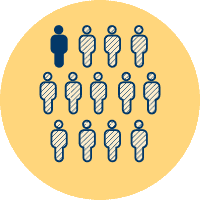Principle 8: Election data is open when it is license-free

Licenses are used to delineate how information is to be re-used or shared. To make election data truly open and public, it must be "maximally re-usable" and there should be no barriers for that re-use.[1] License-free data is data that is open for re-use and redistribution for any purpose.
Typically, a license is a set of obligations to which a user agrees so they can access data or acquire the right to make copies of the data. In the private sector, works are copyrighted and a license is required to alter the default "all-rights-reserved" state. In Open Government Data: The Book, Joshua Tauberer describes license-free data as data "not limited by intellectual property law such as copyright, patents, or trademarks, contractual terms, or other arbitrary restrictions." Because copyright laws vary from place to place, the EMB may need to be explicit about the public domain status of election data. If in a specific country, a copyright applies to public information, then the EMB should work with the relevant authorities to truly put the data in the public domain.
The Open Data Policy Guidelines recommend that if the data are not explicitly in the worldwide public domain, then the data "should be given an explicit public domain dedication."[2] Tauberer notes that in the case of the United States, licenses typically build on copyright and other related restrictions. In the United States, most federal government data is not subject to copyright.[3] Thus, the use of licensing for election data would be "contrary to the long tradition that federal government data is in the public domain." The data are "born free" into the public domain and there is no need for a license to make it explicitly open. However, in many European countries the government does have a copyright over works it makes. In those cases, a license is needed to put the data in the public domain and make it available for anyone to use.
Argentina is a great example of a country where election data has explicitly been put in the public domain. The government created a web portal where they publish government data as one of many ways to fulfill the commitments they made under the Open Government Partnership (OGP). In 2013, the provisional election results were made available on the public data portal. In addition, the data was given an explicitly open license (the Open Data Commons Open Database License (ODbL), which does not restrict the use or redistribution of the election data) and the licensing was widely publicized to encourage the public to access and use the data.
Evolution of the UK Open Government License: From minimal requirements to maximally open. The UK's Open Government License under which the UK's government publishes public sector information is under their "Open Government License." In the first version of the license users were required to make sure that they did not "mislead others or misrepresent the information." The UK government consulted members of the open data community – including members of the Open Definition Advisory Council. As a result, version 2.0 of the license was released in 2013. In version 2.0 of the license, the government purposefully removed the "mislead" requirement because they did not want to restrict usage of data. By removing that requirement (and only requiring attribution[4]), the UK's Open Government License became compliant with the 'Open Definition' as defined by the open data community.
The phrase "maximally re-usable" is used in guideline 11 of the Sunlight Foundation's Open Data Policy Guidelines: "If information is to be truly public, and maximally re-usable, there should be no license-related barrier to the re-use of public information." ↩︎
The Open Data Policy Guidelines document recommends the Creative Commons CC0 statement or an Open Data Commons Public Domain Dedication and License (PDDL)—both of which combine a waiver and a license. ↩︎
In cases where federal government data is restricted the following page contains guidance for explicitly ensuring public government data is released in the United States: Open Government Data: Best-Practices Language for Making Data "License-Free" The page provides example language that can be attached to data so that the data may "meet, and/or make it clear that they meet, the criteria of the 'license-free' principle" regardless of whether they are produced by the government or a government contractor. ↩︎
In version 2.0 of the license, a user is to "acknowledge the source of the Information by including any attribution statement specified by the Information Provider(s) and, where possible, provide a link to this license." ↩︎
